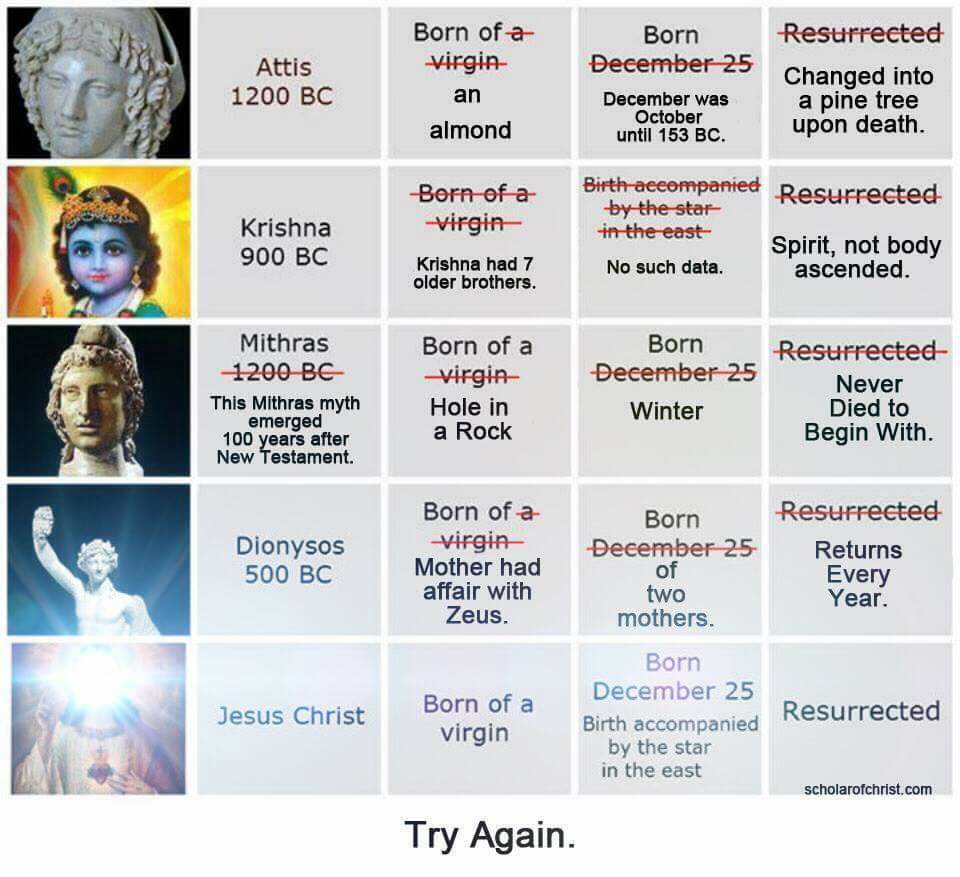Note: I do believe that Jesus was born on December 25th.
Biblically speaking, it’s really based off of the conception of John the Baptist and the annunciation of the Holy Spirit to Mary.
The Archangel Gabriel appearing to Zachariah in the High Temple when he was serving as high priest on the Day of Atonement (Luke 1:8). This placed the conception of St. John the Baptist during the feast of Tabernacles in late September, as the Archangel Gabriel said (Luke 1:28) and his birth nine months later at the time of the summer solstice.
Since the Gospel of Luke states that the Archangel Gabriel appeared to the Virgin Mary in the sixth month after John’s conception (Luke 1:26), this placed the conception of Christ at about the time of the spring equinox, that is, at the time of the Jewish Passover, in late March. His birth would thus be in late December at the time of the winter solstice.
Historically speaking, we see numerous examples.
Saint Telesphorus, Bishop of Rome, who reigned from 126-137 AD, instituted the Lord’s Supper on Christmas Eve. Liber Pontificalis, shows that he was already keeping Christmas, and then added the Supper right before the day occurred.
Theophilus (115-181 AD) was a Bishop in Caesarea who lived under the reign of the Roman Emperor Commodus. Within 100 years of the Apostles, he wrote:
“We ought to celebrate the birth-day of our Lord on what day soever the 25th of December shall happen.” Magdeburgenses, Cent. 2. c. 6. Hospinian, de orign Festorum Chirstianorum
Hippolytus of Rome (170-240 AD), in his commentary on Daniel, wrote this in regards to the date of our Lord’s Birth:
“The first coming of our Lord, that in the flesh, in which he was born at Bethlehem, took place eight days before the calends of January, a Wednesday, in the forty-second year of the reign of Augustus, 5500 years from Adam.” (Commentary on Daniel 4:23)
The eighth before the calends of January is the twenty-fifth day of December, and the forty-second year of Augustus counting from the death of Julius Caesar was 2 BC.
Clement of Alexandria (160-215 AD), also wrote concerning our Lord’s Birth:
“And there are those who have determined not only the year of our Lord’s birth, but also the day; and they say that it took place in the twenty-eighth year of Augustus, and in the twenty-fifth day of Pachon.” (Stromata, I, xxi)
Counting from the death of Antony in 30 B.C., the 28th year of Augustus would have been 2 B.C. The first month of the Egyptian calendar was Thoth, answering to late August (Thoth 1 = August 29). The ninth month was Pachon. The 25th of Pachon answers to the 20th of May. However, this is usually explained by the fact that the months originally took their names from where they occurred in the year. Hence, October, November and December were the eighth, ninth, and tenth months counting from March in the original Roman calendar, which had only ten months. But the Greek Fathers frequently took April, instead of March, for the first month of the year, as we see expressly in St. Chrysostom, in Anastasius Patriarch of Antioch, the Apostolic Constitutions, in Macarius, Stephanus, Gobarus, and other of the ancients. This would make December the ninth counting from April.
Irenaeus of Lyons (120-202 AD), in his works “Against Heresies” believe that March 25th was the date of the annunciation of the Holy Spirit to Mary in Luke 1. Since He based this off of John the Baptist’s birth. Since John the Baptist, was born on the day of atonement, he then set the date of it to September 25th as the day of the feast. Add 9 months later (as you would typically see in a mother giving birth to her child) and you have December 25th
See: Irenaeus: Against Hereseis, 3.10.1-2
Tertullian (160-220 AD), links and equates the equinox with the birth of Christ:
“And the suffering of this “extermination” was perfected within the times of the lxx hebdomads, under Tiberius Caesar, in the consulate of Rubellius Geminus and Fufius Geminus, in the month of March, at the times of the passover, on the eighth day before the calends of April [March 25th], on the first day of unleavened bread, on which they slew the lamb at even, just as had been enjoined by Moses”.(An Answer to the Jews, 8.18)
In 221 AD, you have the Christian Historian Julius Africanus who in his work “chronographai” which lists all of history dating back from 5500 B.C. to the time he wrote this work, lists the conception of Jesus Christ on March 25th.
In the Apostolic Constitutions, which were completed around 380 A.D., lists and dates back all the way to the beginning of the Church, says this about the date of Christ’s Birth:
In the Fifth book, Sec. III, we find:
“Brethren, observe the festival days; and first of all the birthday which you are to celebrate on the twenty-fifth of the ninth month.”
The ninth month counting from Nisan (April) is Casleu in the Jewish calendar. Transferred to our Roman calendar, the ninth month answers to December.
The Byzantine Christian, Nicephorus, wrote an ecclesiastical history in which he lists the Roman Emperor, Diocletian destroying a church on December 25th which celebrated the nativity of Jesus:
“At Nicomedia (a city of Bithynia) when the festival of Christ’s birth-day came, and a multitude of Christians in all ages had assembled together in the temple to celebrate that birth-day. Diocletian the tyrant, having gotten an advantageous occasion whereby he might accomplish his madness and fury, sent men thither to enclose the temple, and to set it on fire round about, and so consumed them all to ashes, even twenty thousand persons.”
John Selden in his work, “Theanthropos” (1661, pp. 33, 34), confirms Nicephorus’ report, saying that ancient Greek and Roman martyrologies date this event to Dec. 25th. And that this event occurred in either 303 or 304 AD.


